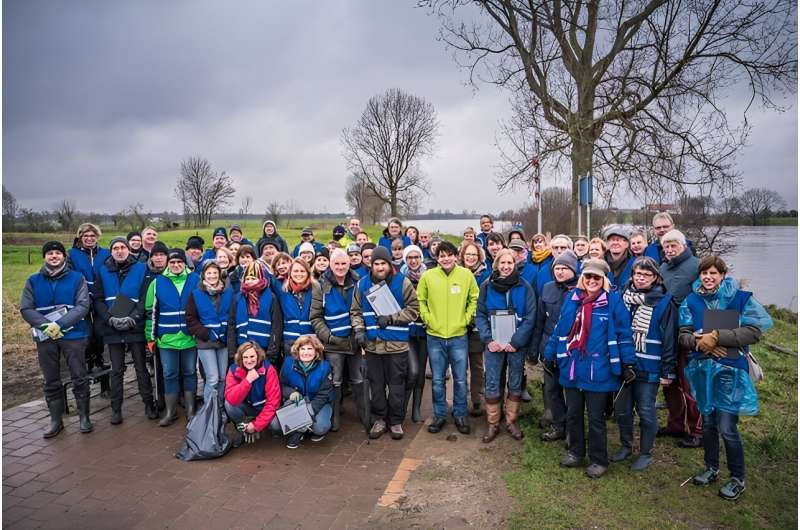
A group of Clean Rivers volunteers working together to map plastic waste on the riverbank. Credit: Schone Rivieren.
What motivates citizens to participate in a citizen science project on plastic pollution? And does that motivation change over time? Liselotte Rambonnet tried to answer these and other questions with her research on the Clean Rivers (“Schone Rivieren”) project.
Rambonnet is a Ph.D. student at the Institute of Biology Leiden and found that participants during this project became increasingly motivated to do something about the plastic problem and that they learned more about plastic pollution and scientific research. The study is published in Citizen Science: Theory and Practice.
What kind of plastic waste is in our rivers? Since 2017, hundreds of Clean Rivers volunteers have been helping to investigate this. Liselotte Rambonnet and her colleagues Frans Rodenburg and Anne Land-Zandstra were curious about their motivation, attitudes and knowledge and how these might change over time. They followed the volunteers for several years using questionnaires.
The river waste researchers appeared to be motivated mainly by wanting the problem of plastic pollution to be tackled at source. Especially this more action-oriented motivation increased significantly, the Leiden study showed. The volunteers were already positive about nature, and science and both changed little as well. Their knowledge about plastic pollution was also already fairly high, about scientific research somewhat less so. Over time, the volunteers learned more, both about plastic pollution and doing research.
Really doing something about the plastic problem
Rambonnet saw the biggest impact in the first year. This is when the volunteers receive training on how to do research, among other things. They then learn how to recognize, categorize and score plastic waste.
“Volunteers participating for the first time might be surprised at what they find,” says Rambonnet. “People sometimes hear about the plastic problem in the news, but to actually see it with their own eyes, is a different thing. Maybe this will further fuel their action-oriented motivation.”
“You also need to have quite a bit of dedication to take part in this, it does ask a lot of the participants,” Rambonnet admits. Twice a year, participants systematically map a stretch of one hundred meters of river bank. “The bank you are mapping is usually not nearby. So to join the project, you must already have the motivation to really want to do something about the plastic problem.”
From science to practice
If you know what motivates volunteers to participate, you can respond accordingly. The previous study on this project already showed that participants are very action-oriented. Therefore, Clean Rivers participants can now also become more active within the project, such as organizing an event or lobbying within their municipality. “Clean Rivers does that very well. They also really translate the scientific results into practical actions,” says Rambonnet.
This study maps for the first time how citizen scientists’ motivation, attitudes and knowledge can change over time. Rambonnet: “We didn’t know much about that before. That motivation can vary by project and by subject. For example, birdwatchers who report observations for science may not necessarily want action at all. Maybe they just like birds and are not at all concerned with what the organizers do with that data.”
Cleaning up the canals
Rambonnet set up a similar project in her own city of Leiden together with Auke-Florian Hiemstra: De Grachtwacht (translated: The Canalwatch). With this, they have been fighting for plastic-free canals since 2018 and making people aware of urban wildlife in and around Leiden’s canals. With De Grachtwacht, they try to trace the source of the waste in order to ensure structurally less plastic in the canal.
In 2023, they even won the NWO Communication Initiative Award with it. “My involvement in Clean Rivers was very instructive for De Grachtwacht,” says Rambonnet. “A lot is happening in the field of plastic pollution research, especially around citizen science. It is great to contribute to that with our research.”
More information:
Liselotte Rambonnet et al, Longitudinal Study of Motivation, Attitude, and Knowledge of Citizen Scientists Monitoring Plastic Pollution On Dutch Riverbank, Citizen Science: Theory and Practice (2024). DOI: 10.5334/cstp.667
Citation:
Working together on the plastic problem: How to keep citizens engaged? (2024, June 6)
retrieved 7 June 2024
from https://phys.org/news/2024-06-plastic-problem-citizens-engaged.html
This document is subject to copyright. Apart from any fair dealing for the purpose of private study or research, no
part may be reproduced without the written permission. The content is provided for information purposes only.
>>> Read full article>>>
Copyright for syndicated content belongs to the linked Source : Phys.org – https://phys.org/news/2024-06-plastic-problem-citizens-engaged.html










